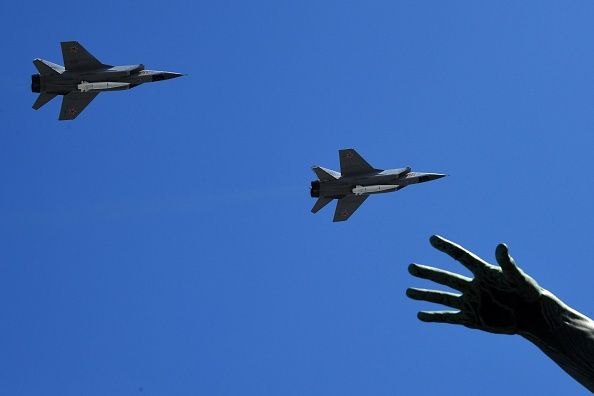
Russian authorities arrested 74-year-old scientist Viktor Kudryavtsev on Monday for allegedly leaking secret information about Russia's hypersonic weapons technology development to operatives in a NATO country.
According to Latvia-based news site Meduza, Kudryavtsev has been charged with treason, and around 12 others are allegedly being investigated in the case. The high-profile arrest sparked curiosity about Russia's hypersonic weapons and why they are so highly prized.
Russia released a video displaying the hypersonic weapons just days after Russian President Vladimir Putin met with President Donald Trump. Putin had first boasted about Russia's hypersonic missile program during a speech in March.
Officials in Russia have also claimed that traditional U.S. missile systems would be unable to defend against the high-tech hypersonic weapons. That's because the hypersonic missiles are much faster than other weapons technology, which makes them harder to intercept. Military experts say the missiles travel over 3,000 miles per hour, around five times faster than the speed of sound.
"Hypersonic weapons incorporate the speed of a ballistic missile with the maneuvering capabilities of a cruise missile. Hypersonic weapons refer to weapons that travel faster than Mach 5 (3,800mph) and have the capability to maneuver during the entire flight," according to a report from the Missile Defense Advocacy Alliance group (MDAA), which supports missile defense for the U.S. and its allies.
"Hypersonic weapons are specifically designed for increased survivability against modern ballistic missile defense systems. These missiles are capable of delivering conventional or nuclear payloads at ultra-high velocities over long ranges," the document underscored.
The MDAA added that hypersonic missiles "are delivered in two ways: (1) they can be fired from the last stages of Intercontinental Ballistic Missiles (ICBM) or Submarine-Launched Ballistic Missiles (SLBM) and skip along the top of the atmosphere using specialized jet engines to accelerate to hypersonic speeds; or (2) they can be launched independently or released from a bomber—similar to cruise missiles—before accelerating to ultra-high speed."
The hypersonic missiles are still unable to dodge U.S. missile defense systems like the U.S. Patriot system, but this could potentially change in the coming years as the technology advances. In Russia, the Iskander-M mobile short-range ballistic missile systems are currently being used for hypersonic missiles, and tests are being carried out with the Kh-47M2 Kinzhal missiles. Tests have reportedly been successful, and some estimates say the hypersonic missile blueprints could be available by 2020. Moreover, research to make the missiles faster and more maneuverable is ongoing.
Aside from Moscow, the U.S., U.K., China, India, and Australia are all developing some form of hypersonic missile. But only the U.S. and China are developing hypersonic gliders, which are generally placed on top of rockets and glide above the atmosphere until they reach their target. Of all the countries currently working on the development of hypersonic missiles, the U.S., Russia, and China have the most advanced hypersonic technology.
The report from Meduza does not specify which NATO member country allegedly received classified information from Kudryavtsev. He has maintained his innocence.
Uncommon Knowledge
Newsweek is committed to challenging conventional wisdom and finding connections in the search for common ground.
Newsweek is committed to challenging conventional wisdom and finding connections in the search for common ground.
About the writer
Cristina Maza is an award-winning journalist who has reported from countries such as Cambodia, Kyrgyzstan, India, Lithuania, Serbia, and Turkey. ... Read more
To read how Newsweek uses AI as a newsroom tool, Click here.








